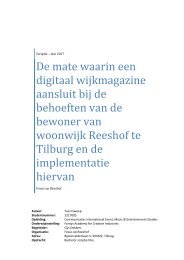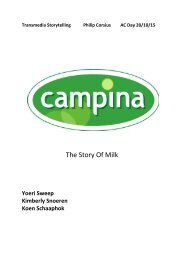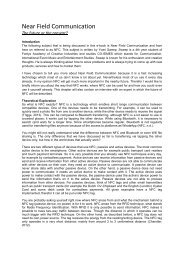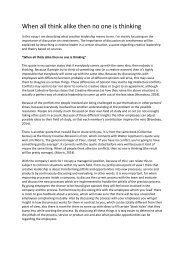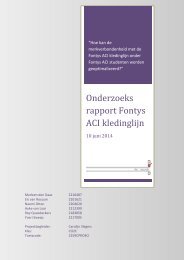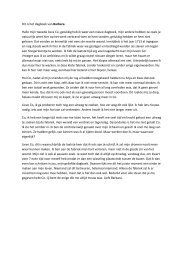Strategic Communication Management
Create successful ePaper yourself
Turn your PDF publications into a flip-book with our unique Google optimized e-Paper software.
customers in a clear way so that they understand the purpose of why a product isn’t in store<br />
at the moment. In this way Jumbo and the customer can (if necessary) put pressure on the<br />
producers to change the packages.<br />
4.1.4 Stakeholder 4; Media<br />
The most influential stakeholders in almost all issues are media, because people easily buy<br />
what the news tells them or what they read in journals. If the media hits you as a company,<br />
you are most likely to get big reputational problems. This is because media reaches many<br />
people at once. When an issue gets bigger and activist organizations are putting companies<br />
under the daylight, news castings and journals normally also pick it up and put it on their<br />
agenda. It is very important to be very good prepared if it comes to this. Stakeholders collect<br />
most of the information about organizations from news castings and journals. That’s why<br />
media coverage is very important to an organization’s reputation (Coombs, 2007).<br />
For Jumbo it is better to bring out news by claiming and controlling the issue than being on<br />
the news negatively as a surprise. The media has a big influence on both the issue as on the<br />
company, but isn’t moving until activist organisations draw attention to a certain company<br />
or issue or until a scandal occurs.<br />
4.1.5 Stakeholder 5; Competition<br />
The competition isn’t a great stakeholder of the issue yet. Nevertheless they could<br />
potentially be one of the most impactful stakeholders on the issue if they decide to be the<br />
first to claim the issue. That’s why they are put in the significant influence spot in the tool<br />
above. There are already some supermarkets which only sell products without packages,<br />
those already have a significant influence on the issue. They are not big competitors for a big<br />
chain as Jumbo yet, but they could be if audience arises. If other big competitors of Jumbo,<br />
like Albert Heijn, Lidl and Plus, start claiming the issue, this could have great impact on<br />
Jumbo, since by then they would be (one of) the only big supermarket chains which isn’t<br />
handling the issue in a right way yet.<br />
Moreover it would be a good step to be (one of) the first big supermarkets who reduces or<br />
doesn’t use (over) packaging anymore. With the upcoming care for the environment and<br />
media attention on the problems of over packaging and food waste, the need for a transition<br />
in society occurs. A sustainability transition generally refers to a “radical transformation<br />
towards a sustainable society as a response to a number of persistent problems<br />
confronting contemporary modern societies” (De Araújo Avelino, 2011). In this case, the<br />
persistent problems who confront the contemporary modern society are over packaging and<br />
food waste. Participants in the transition area need to have leadership abilities (De Araújo<br />
Avelino, 2011). When Jumbo decides to step up and be a frontrunner in reducing packaging,<br />
it could create a transition towards less packaging and food waste. Furthermore, the<br />
empowerment of frontrunners is an essential aspect of transition management (De Araújo<br />
Avelino, 2011). Hence, if Jumbo really wants to make a difference, and distinct itself from<br />
other supermarkets, they should be the frontrunner in reducing over packaging and food<br />
Yoeri Sweep 2217005 Pagina 15



